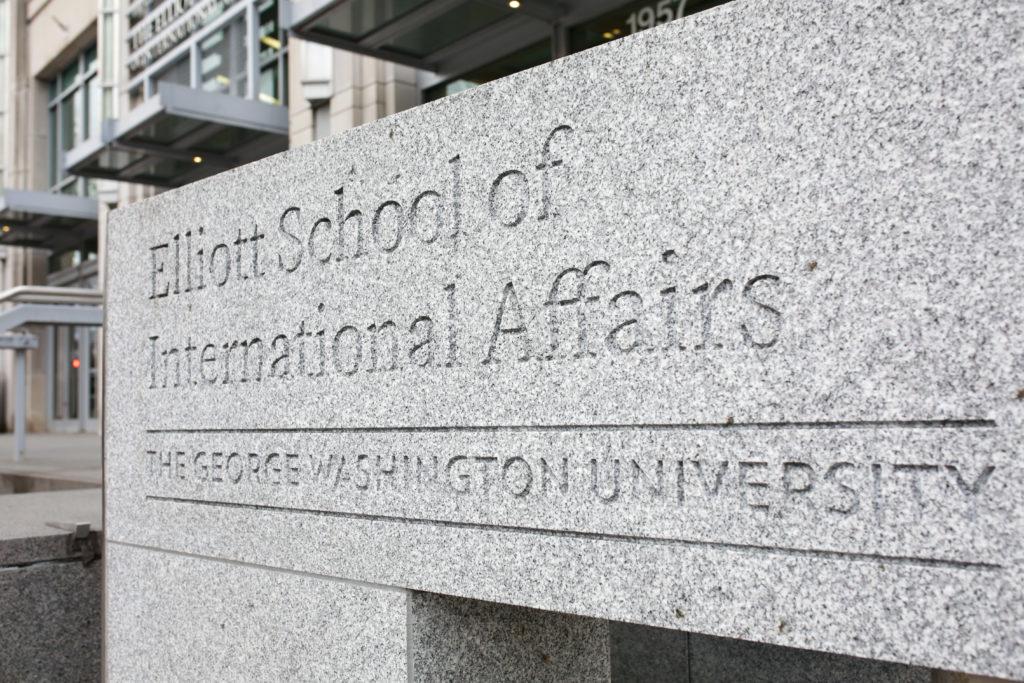Students in the Elliott School of International Affairs will soon be able to graduate with a Bachelor of Science.
Officials said the new degree, which will be available this fall, is designed to prepare students to tackle “pressing” issues in international affairs like cybersecurity and space policy and will allow students to add a second major in a science field without having to pursue a dual degree.
“International relations from the Elliott School plus a public health degree or plus a data analyst degree or a computer science or a chemistry degree or whatever it might be, I think students will just be much stronger in the labor pool,” University President Thomas LeBlanc said at a Faculty Senate meeting earlier this month.
Students interested in earning the Bachelor of Science must earn a minimum of 18 credits in the science and engineering disciplines at the 2000 level or above and take courses like Research Methods, Historical Analysis of U.S. Foreign Policy and International Economics, according to the school’s website.
Lisa Stephenson, the associate dean for academic affairs and student services in the Elliott School, said the new degree option was approved last year and developed by a group of faculty members under the guidance of the provost’s office. She said the core curriculum for both the bachelor’s degrees will be the same, and the school will appoint a new program director in the coming months.
“The main challenge faced when developing the Bachelor of Science in international affairs was maintaining this strong core and integrating additional STEM coursework, all the while maintaining the flexibility for students to pursue second majors with other Bachelor of Science programs within GW,” she said.
She added that the program director and student advisers will ensure that students interested in the program have “ample” time to select courses in their core that fulfill the prerequisites.
“Although we cannot predict how many students will elect to declare the new Bachelor of Science in international affairs as their major, we anticipate great interest based on the enthusiasm and feedback we have received thus far,” she said.
LeBlanc, the University president, said at the Faculty Senate meeting earlier this month that creating the Bachelor of Science degree was a “milestone” achievement in response to student feedback.
He said that previously, it was “almost impossible” to graduate in four years with a Bachelor of Arts in international affairs and a Bachelor of Science in another discipline. Students pursuing a double degree must complete 150 credit hours, according to the University bulletin.
“You have a whole bunch of students who are doing double majors but Elliott School students couldn’t double major in STEM discipline,” LeBlanc said.
Filip Vachuda, a freshman majoring in international affairs, said he originally planned to pursue a dual degree in international affairs and computer science, but the new degree will allow him to instead double major and more easily enter required engineering courses, like Introduction to Software Development.
“The Bachelor of Science in international affairs will only make things a lot easier,” he said in an email.
Twenty-seven faculty in the Elliott School did not return multiple requests for comment, and seven faculty declined to comment because they said they were not aware of the new degree.
Henry Nau, a professor of political science and international affairs, said he was both “surprised” and “skeptical” to hear about the new degree because the science-oriented courses will only be useful to students if they complement their courses in international affairs.
“If you want to get more technical training into students, then make these required courses in the technical programs like cybersecurity or even terrorism and counterintelligence where you can have courses that require students to consider the collection and manipulation and interpretation of large amounts of data,” Nau said.
Lauren Peller and Shannon Mallard contributed reporting.




